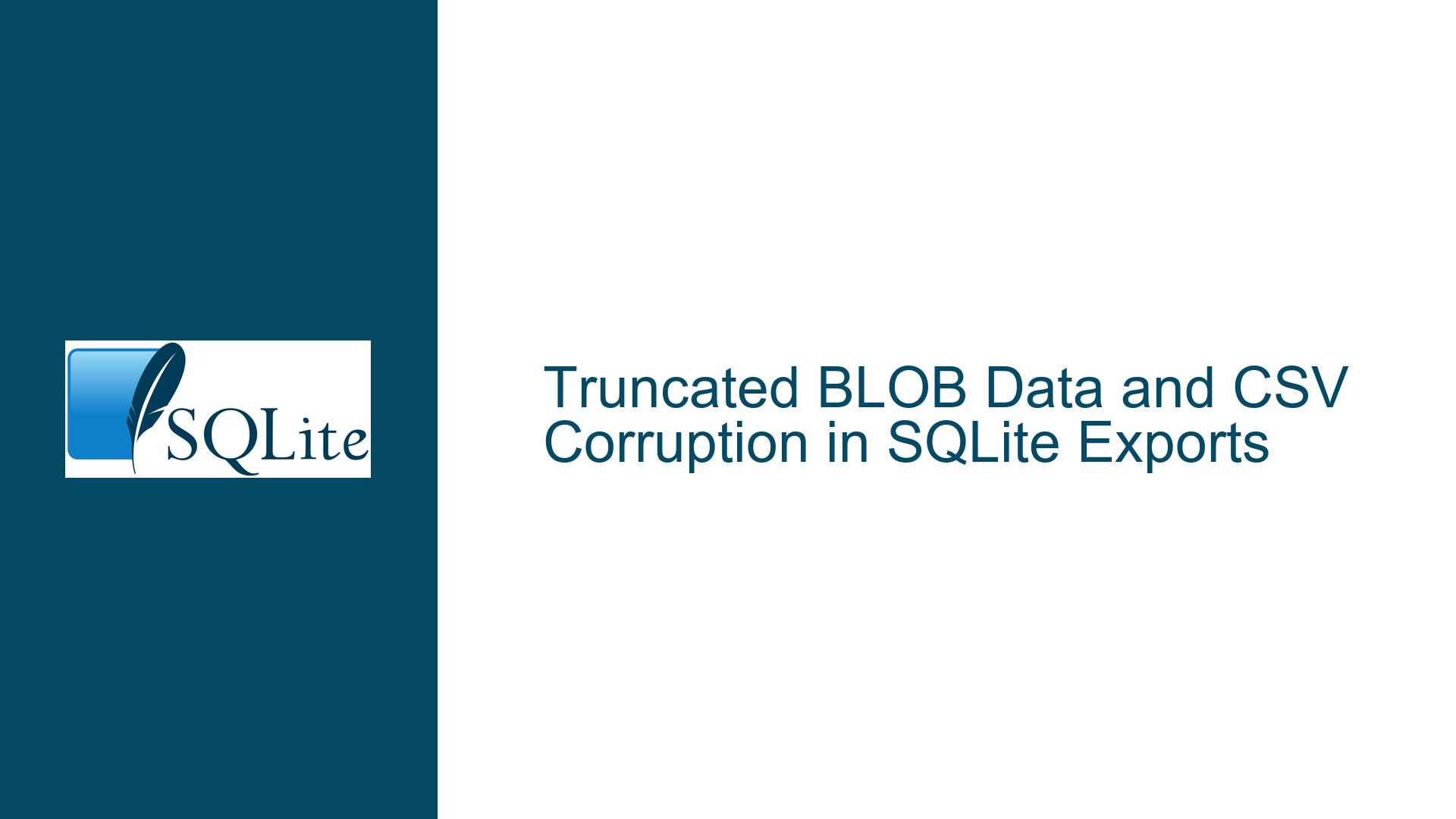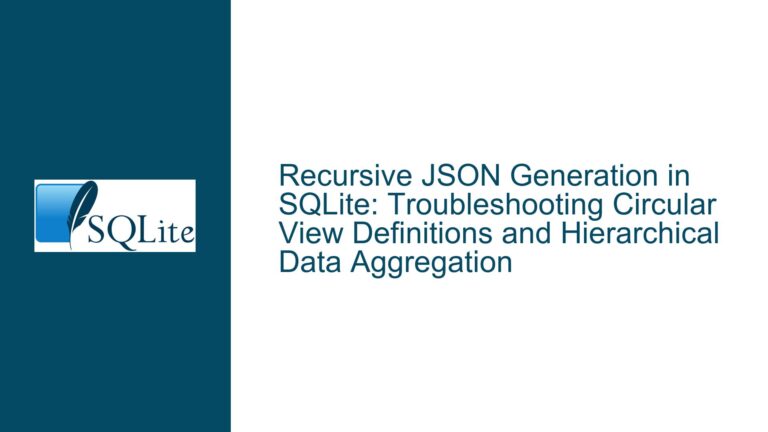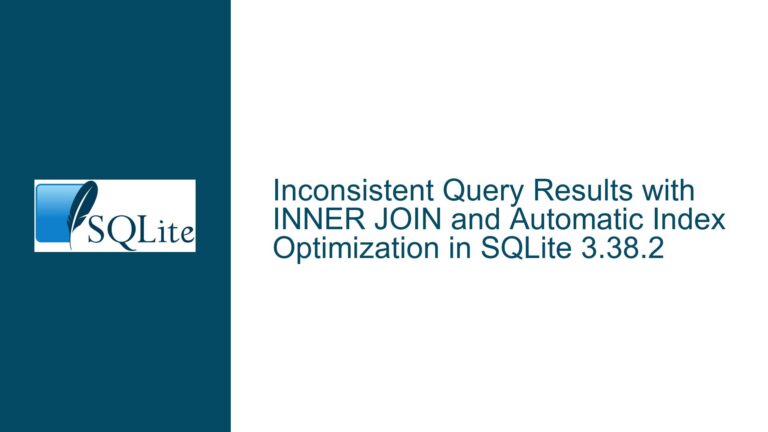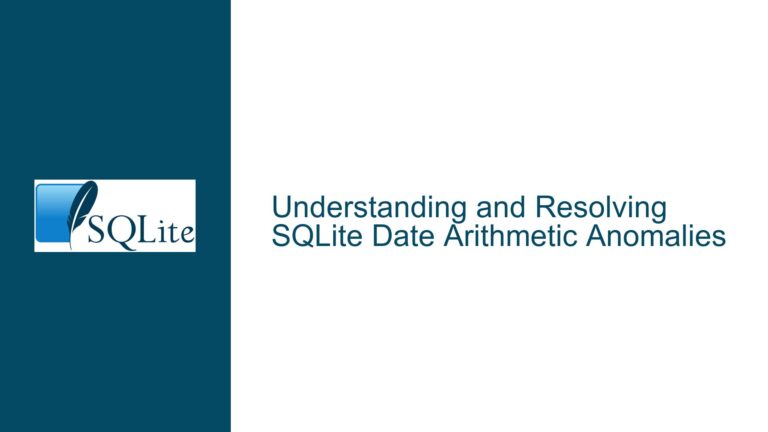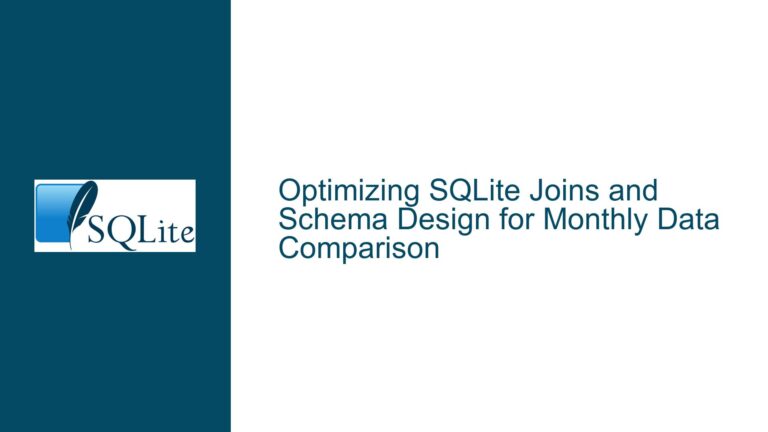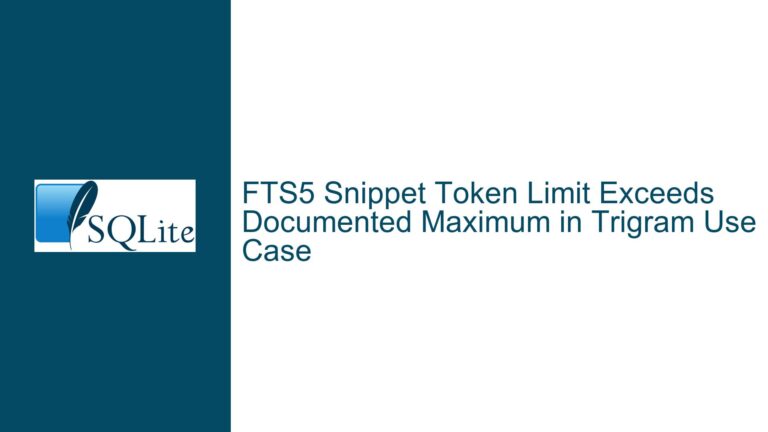Truncated BLOB Data and CSV Corruption in SQLite Exports
BLOB Truncation at Null Bytes and CSV Format Limitations
The primary issue reported involves exporting binary data (BLOBs) from SQLite using the CSV output mode (.mode csv), which results in two distinct forms of data corruption:
Truncation of BLOB Data at Null Bytes
When a BLOB contains a null byte (0x00), the SQLite command-line interface (CLI) truncates the BLOB at the first null byte during CSV export. For example, a BLOB with the hexadecimal valueX'41420043'(which decodes to the ASCII charactersABfollowed by a null byte andC) will be exported asABin CSV mode. The CLI does not account for the full length of the BLOB, instead treating it as a C-style null-terminated string.CSV Structural Corruption Due to Unescaped Quotes
BLOBs containing unescaped quote characters (") can disrupt the CSV format. For instance, a BLOB with the valueX'22414222'(which decodes to"AB") would be exported as"AB"in CSV mode. Since CSV uses quotes to denote field boundaries, this unescaped quote breaks the CSV structure, leading to parsing errors during re-import.
These issues arise from the inherent mismatch between CSV (a text-based format) and BLOBs (arbitrary binary data). The CSV standard (RFC 4180) explicitly defines CSV fields as text, with no provisions for binary data. SQLite’s CSV export mode adheres to this standard but does not automatically sanitize or encode binary data, leading to silent data corruption.
CLI Behavior and Data Sanitization Expectations
The SQLite CLI’s handling of BLOBs in CSV mode is consistent with its design principles but conflicts with user expectations in specific scenarios:
C-String Handling in CLI Output
The CLI uses C-string functions (e.g.,printf("%s", z)) to output data, which interpret the first null byte (0x00) as the end of a string. This behavior is correct for text data but inappropriate for BLOBs, where null bytes are valid and must be preserved. For example:SELECT X'41420043'; -- Output: 'AB' (truncated at null byte)In contrast, other output modes like
quoteorinserthandle BLOBs correctly by iterating over their full length:.mode quote SELECT X'41420043'; -- Output: X'41420043' (full BLOB)CSV as a Text-Only Format
CSV is not designed to store binary data. Exporting BLOBs to CSV without explicit encoding (e.g., hex, base64) violates the format’s constraints. Users expecting CSV to handle BLOBs natively are operating under a misconception.Lack of Data Sanitization Warnings
The CLI does not warn users when exporting BLOBs to CSV, even though this can lead to data loss or corruption. Users unaware of CSV’s limitations may incorrectly assume the CLI automatically sanitizes binary data.
Resolving Data Corruption and Ensuring BLOB Integrity
To safely export BLOBs from SQLite while preserving data integrity, use the following strategies:
1. Use Appropriate Output Modes
.mode quote
This mode exports BLOBs as hexadecimal literals (e.g.,X'41420043'), which can be re-imported without data loss..mode quote .output data.sql SELECT * FROM temp;.mode insert
Generates SQLINSERTstatements, preserving BLOBs as hexadecimal literals. To createINSERT OR IGNOREstatements, modify the output manually or use a script:.mode insert .output data.sql SELECT * FROM temp; -- Replace "INSERT INTO" with "INSERT OR IGNORE INTO" in data.sql
2. Encode BLOBs as Text
Use SQL functions to convert BLOBs to text formats before exporting:
- Hexadecimal Encoding
SELECT hex(field) FROM temp; -- Exports BLOB as hex string (e.g., '41420043') - Base64 Encoding
Requires a user-defined function or post-processing:-- Using PowerShell (Windows): sqlite3 temp.db "SELECT field FROM temp" | ForEach-Object { [Convert]::ToBase64String([System.Text.Encoding]::UTF8.GetBytes($_)) }
3. Export to a Binary-Safe Format
Use SQLite’s .dump command to generate a SQL script that preserves BLOBs:
sqlite3 temp.db .dump > data.sql
Re-import with:
sqlite3 new.db < data.sql
4. Validate and Repair CSV Exports
If CSV is required, sanitize BLOBs before export and validate the CSV post-import:
- Sanitize with
quote().mode csv SELECT quote(field) FROM temp; -- Wraps BLOB in quotes and escapes internal quotes - Post-Import Validation
After importing the CSV, verify BLOB lengths:SELECT length(field) FROM temp; -- Ensure lengths match original data
5. Modify the CLI Source Code
Advanced users can modify the CLI’s CSV output logic to handle BLOBs correctly. In shell.c, replace C-string functions with loops that process BLOBs byte-by-byte:
// Original code (truncates at null byte):
utf8_printf(p->out, "%s", z);
// Modified code (prints full BLOB):
for(int i=0; i<len; i++){ putc(z[i], p->out); }
6. Submit a Feature Request or Bug Report
While the current behavior is intentional, users can request enhancements via SQLite’s GitHub Issues or the forum. Example proposal:
**Proposal:** Add a `.mode csv_binary` that encodes BLOBs as hex/base64 in CSV exports.
**Rationale:** Prevent silent data corruption when exporting BLOBs.
By understanding the limitations of CSV and leveraging SQLite’s tools for binary data handling, users can avoid data corruption and ensure reliable exports.
